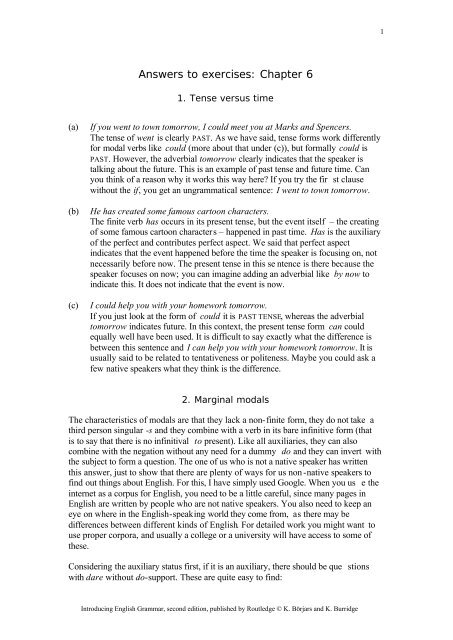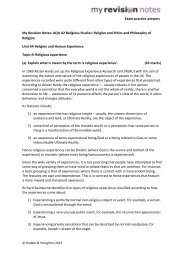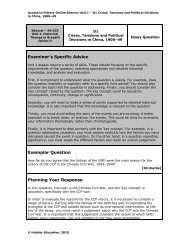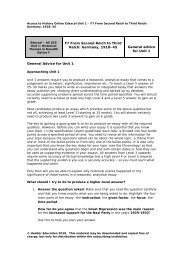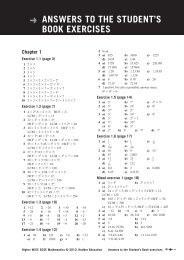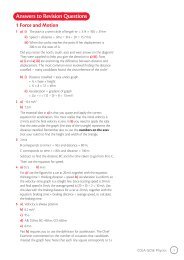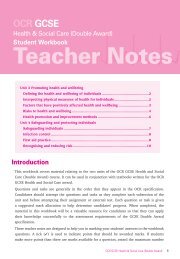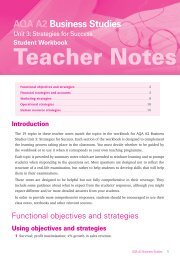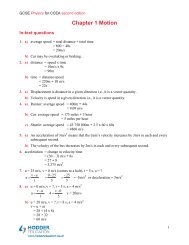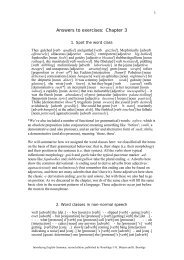Create successful ePaper yourself
Turn your PDF publications into a flip-book with our unique Google optimized e-Paper software.
1<strong>Answers</strong> <strong>to</strong> <strong>exercises</strong>: <strong>Chapter</strong> 61. Tense versus time(a)(b)(c)If you went <strong>to</strong> <strong>to</strong>wn <strong>to</strong>morrow, I could meet you at Marks and Spencers.The tense of went is clearly PAST. As we have said, tense forms work differentlyfor modal verbs like could (more about that under (c)), but formally could isPAST. However, the adverbial <strong>to</strong>morrow clearly indicates that the speaker istalking about the future. This is an example of past tense and future time. Canyou think of a reason why it works this way here? If you try the fir st clausewithout the if, you get an ungrammatical sentence: I went <strong>to</strong> <strong>to</strong>wn <strong>to</strong>morrow.He has created some famous car<strong>to</strong>on characters.The finite verb has occurs in its present tense, but the event itself – the creatingof some famous car<strong>to</strong>on characters – happened in past time. Has is the auxiliaryof the perfect and contributes perfect aspect. We said that perfect aspectindicates that the event happened before the time the speaker is focusing on, notnecessarily before now. The present tense in this se ntence is there because thespeaker focuses on now; you can imagine adding an adverbial like by now <strong>to</strong>indicate this. It does not indicate that the event is now.I could help you with your homework <strong>to</strong>morrow.If you just look at the form of could it is PAST TENSE, whereas the adverbial<strong>to</strong>morrow indicates future. In this context, the present tense form can couldequally well have been used. It is difficult <strong>to</strong> say exactly what the difference isbetween this sentence and I can help you with your homework <strong>to</strong>morrow. It isusually said <strong>to</strong> be related <strong>to</strong> tentativeness or politeness. Maybe you could ask afew native speakers what they think is the difference.2. Marginal modalsThe characteristics of modals are that they lack a non-finite form, they do not take athird person singular -s and they combine with a verb in its bare infinitive form (thatis <strong>to</strong> say that there is no infinitival <strong>to</strong> present). Like all auxiliaries, they can alsocombine with the negation without any need for a dummy do and they can invert withthe subject <strong>to</strong> form a question. The one of us who is not a native speaker has writtenthis answer, just <strong>to</strong> show that there are plenty of ways for us non -native speakers <strong>to</strong>find out things about English. For this, I have simply used Google. When you us e theinternet as a corpus for English, you need <strong>to</strong> be a little careful, since many pages inEnglish are written by people who are not native speakers. You also need <strong>to</strong> keep aneye on where in the English-speaking world they come from, as there may bedifferences between different kinds of English. For detailed work you might want <strong>to</strong>use proper corpora, and usually a college or a university will have access <strong>to</strong> some ofthese.Considering the auxiliary status first, if it is an auxiliary, there should be que stionswith dare without do-support. These are quite easy <strong>to</strong> find:Introducing English Grammar, second edition, published by Routledge © K. Börjars and K. Burridge
2(1) Dare I say that I think he offends people?To some people this sounds a little formal or old -fashioned, but a Google search alsoshowed that you can buy a t-shirt with the text:(2) How dare I wear this goddamn t-shirt in front of your f***ing kids? (Thoughthe t-shirt does not use stars!)So it is not barred from less formal language.At the same time, I found examples like this, where do-support is used:(3) How does he dare say such a thing!It is a similar mixture with negation. I found:(4) I dare not tell my parents.as well as:(5) She doesn’t dare <strong>to</strong> interrupt him.Dare seems <strong>to</strong> be used both as an auxiliary and as a lexical verb. If you are a nativespeaker, which of the sentenc es above would you naturally use? Are you a dareauxiliaryor a dare-lexical person?The data I have found so far has interesting things <strong>to</strong> tel l us about the modal status<strong>to</strong>o. Remember that a modal combines with a bare infinitive. Compare (4), wheredare behaves like an auxiliary, and (5), where it doesn’t. You can see that , as wewould expect, it occurs without <strong>to</strong> in (4) and with a <strong>to</strong> in (5). So, when it behaves likean auxiliary, it also behaves like a modal, and the other way around.However, things are not quite that orderly. In (3), it behaves like a lexical verb in thatit requires do-support, but it does combine with a bare infinitive, so it shows mixedbehaviour. It is possible also <strong>to</strong> find examples with dare and both do-support and a <strong>to</strong>infinitive:(6) How does he dare <strong>to</strong> sing something like that?With respect <strong>to</strong> the third person singular -s, which modals do not have, we find thesame mixed behaviour:(7) He is outraged that she dare do such a thing.(8) She dares <strong>to</strong> do things she would never do otherwise.In (7), we have the typical modal lack of -s and the verb behaves like a modal also inthat there is no <strong>to</strong>. In (8), on the other hand, we have both the -s and the infinitival <strong>to</strong>,both typical of lexical verbs. However, by now we should be used t o it not being thatneat and indeed, we get mixed behaviour, -s typical of non-modal verbs, but anabsence of <strong>to</strong> typical of modals:(9) I'm more pissed about how she dares do this crap <strong>to</strong> me.So calling dare a marginal modal definitely seems the right thing <strong>to</strong> do: its behaviourseems very mixed. What I haven’t done here is attempt <strong>to</strong> distinguish between theages of speakers or their geographical origin, but I bet a more detailed study of thatwould be interesting.Let’s turn now <strong>to</strong> ought <strong>to</strong>. The fact that we say ought <strong>to</strong> rather than ought wouldseem <strong>to</strong> indicate that it always occurs with <strong>to</strong>. However, it is not impossible <strong>to</strong> findexamples without <strong>to</strong>:(10) Maybe she ought do her own Nickel-and-Dimed-type experiment and writeabout that?Introducing English Grammar, second edition, published by Routledge © K. Börjars and K. Burridge
3Even though it tends <strong>to</strong> occur with <strong>to</strong>, as a good lexical verb should, it also tends <strong>to</strong>occur without -s, as a good lexical verb shouldn’t:(11) She ought <strong>to</strong> brush up on her Latin.However, some people do use the -s and the <strong>to</strong>, in which case it doesn’t behave like amodal at all, at least not structurally, though its meaning is the kin d of meaning amodal would have – it is very close in meaning <strong>to</strong> should. This example is from ablog associated with the Florida Agricultural and Mechanical University, so USEnglish:(12) She oughts <strong>to</strong> be ashamed of how she behaved.Looking now at the more general auxiliary characteristics, like question formationand negation, I Googled for ought she <strong>to</strong> as an example of inverted order, and amongthe first ten hits were the following three examp les:(13) ‘And ought she <strong>to</strong> desert her heavenly Father, my child?’ asked the aunt,mildly.(14) When a lady opens her own door <strong>to</strong> a gentleman visi<strong>to</strong>r, ought she <strong>to</strong> precedehim in<strong>to</strong> the house or allow him <strong>to</strong> take precedence?(15) Ought she <strong>to</strong> spend the usual college years in a school for matrimony?The example in (13) comes from the 1820 American novel Precaution, (14) from an1892 book on etiquette and (15) from the article ‘Wherein should the education of awoman differ from that of a man’, published in The School Review in 1905. So, on thebasis of this, it looks as if treating ought as an auxiliary with respect <strong>to</strong> questionformation is a little old fashioned. However, if it were treated as a lexical verb, theequivalent would be Did she ought <strong>to</strong> …? and a search for that does not give manyproper examples. So, how do speakers form a question from She ought <strong>to</strong> brush upher Latin? I suspect they say Should she brush up her Latin?Looking at negation now, oughtn’t gives some hits, but one of them is from alanguage forum at Wordreference.com.(16) "'As you haven't asked my opinion, perhaps I oughtn't give it,'"... (Lost Horizon,P43)I can't even pronounce it. Have any of you guys ever used it or heard someoneuse it?Thanks,–Jonathan.So, there are clearly people who are not so happy with it.It fares better if we look for the full negation. W e get examples both with and without<strong>to</strong>:(17) Economic sanctions ought not be used <strong>to</strong> achieve foreign policy objectives.(18) A just society ought not <strong>to</strong> use the death penalty as a form of punishment.One example I found, in which ought has all structural characteristics of a modal,sounds strange <strong>to</strong> many native speakers I have asked:(19) What ought she know?It comes from a local American paper, the Reading Eagle (Reading, PA).So, ought is a marginal modal, but it is marginal in a different way from need. Manypeople would use should instead.Introducing English Grammar, second edition, published by Routledge © K. Börjars and K. Burridge
43. Lexical versus auxiliary verbs(a)(b)(c)(d)(e)(f)(g)Bob Dylan has [AUXILIARY VERB, FINITE, THIRD PERSON SINGULAR PRESENTTENSE] at various times revolutionised [LEXICAL VERB, NON-FINITE, PPART] folk,rock, country and gospel music.From the very first, this was [LEXICAL VERB, FINITE, SINGULAR PAST TENSE] anartist who made [LEXICAL VERB, FINITE, PAST TENSE] us look [LEXICAL VERB,NON-FINITE, BARE INFINITIVE] at the familiar with new eyes and ears.Was can be an auxiliary verb as well, but this is the lexical one because it takesan NP complement. When it is an auxiliary, it is followed by a verb. Look at (g)and you’ll see what we mean.We know look is non-finite because it cannot be changed in<strong>to</strong> past tense.Isn’t [LEXICAL VERB, FINITE, THIRD PERSON SINGULAR PRESENT TENSE,NEGATIVE] there enough irreverence in the world?We said that even when it is a lexical verb, is and other forms of be can invert <strong>to</strong>form a question.The songs don’t [AUXILIARY VERB, FINITE, PLURAL PRESENT TENSE, NEGATIVE]require [LEXICAL, NON-FINITE, BARE INFINITIVAL] much acting.You might also have assumed that acting was a verb. Of course it can be, as i nHe was only acting, but clearly it can also be a noun as in the acting was poor.One way of testing whether it is a verb or a noun is <strong>to</strong> add some modification.Nouns are modified by adjectives like good and verbs by adverbs like well. In(d), acting would be modified by good rather than well: The songs don’trequire much good/*well acting. We conclude then that acting is a noun here.The inflections would [AUXILIARY VERB, MODAL, FINITE (PAST)] maybe differ[LEXICAL VERB, NON-FINITE, BARE INFINITIVE] if we changed [LEXICAL VERB,FINITE, PAST TENSE] the key and sometimes that might [AUXILIARY VERB,MODAL, FINITE (PAST)] affect [LEXICAL VERB, NON-FINITE, BARE INFINITIVE] theemotional resonance.We have put PAST in brackets here since tense works in a s lightly unusual waywith modals.Did [AUXILIARY VERB, FINITE, PAST TENSE] you have [LEXICAL VERB, NON-FINITE, BARE INFINITIVE] a favourite cowboy singer as a kid?Have is a lexical verb here by the same arguments we used for was in (b).Nothing back there would [AUXILIARY VERB, MODAL, FINITE (PAST)] play[LEXICAL VERB, NON-FINITE, BARE INFINITIVE] any part in where I was[AUXILIARY VERB, FINITE, SINGULAR PAST TENSE] going [LEXICAL VERB, NON-FINITE, ING FORM].4. Categories of lexical verbsIntroducing English Grammar, second edition, published by Routledge © K. Börjars and K. Burridge
5(a)(b)(c)(d)(e)(f)(g)(h)(i)(j)(k)That didn’t s<strong>to</strong>p one of the sons of this unremarkable Cheshire <strong>to</strong>wn.MONO-TRANSITIVE: it takes one object.A chance remark gave Warring<strong>to</strong>n the idea of ostrich dealing over the Internet.DI-TRANSITIVE: two objects.I <strong>to</strong>ld him <strong>to</strong> check the Internet.DI-TRANSITIVE: it takes an indirect object and a clausal object, which takes theform of a <strong>to</strong>-infinitival clause.You might have wondered whether <strong>to</strong> consider him an object or an unusualsubject. We consider it an object here because if (c) is true, then it is also truethat I <strong>to</strong>ld him.Ostriches on line was born.INTENSIVE: it combines with a subject complement.I marketed everything <strong>to</strong> do with ostriches.MONO-TRANSITIVE: combines with an object.The demand for leather and feathers is especially high.INTENSIVE: combines with a subject complement .The ostrich industry is on the up.INTENSIVE: combines with an adverbial complement .It might become the first ostrich theme park.INTENSIVE: combines with a subject complement .I treat my ostriches very well.This is a tricky one. There are two complements, my ostriches and very well.Very well is a complement, not an optional adverbial, since I treat my ostrichesmeans something else (either that you buy them some ice cream or that you area vet providing them with some medication). My ostriches is an object, sincethere is a corresponding passive my ostriches are treated very well by me. Verywell behaves like an object complement in some ways and we shall then callthis COMPLEX TRANSITIVE. If you argued it differently, check with your tu<strong>to</strong>r,but if you said DI-TRANSITIVE or assumed that there was only one complementfollowing the verb, we don’t think you are right.I don’t agree with battery farming.MONO-TRANSITIVE, but we do assume that the preposition combines with theverb, so that it should be described as a PREPOSITIONAL MONO-TRANSITIVE verb.The reason we say this is that we think (i), where the V and the P are kept<strong>to</strong>gether, is more natural than (ii), where the P stays with the NP:(i) What I don’t agree with is battery farming.(ii) ?What I don’t agree is with battery farming.I met my girlfriend through a website chatroom.MONO-TRANSITIVE: through a website chatroom is an optional adverbial anddoes not count for the verb classification.Introducing English Grammar, second edition, published by Routledge © K. Börjars and K. Burridge


